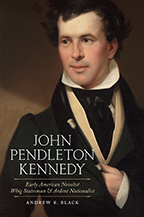
360 pages / 6.00 x 9.00 inches / no illustrations
Biography / Literary Figures | History / United States - Southern History
Andrew R. Black has a PhD in history from Boston University. He is also the author of John Pendleton Kennedy: Early American Novelist, Whig Statesman, and Ardent Nationalist.
“Incisive and beautifully written, Andrew Black's biography of John Pendleton Kennedy is a fascinating exploration of the impact of Kennedy’s Whig principles and of contemporary events on his literary output. A very good book indeed.”—Michael F. Holt, author of The Rise and Fall of the American Whig Party: Jacksonian Politics and the Onset of the Civil War
“John Pendleton Kennedy is a comprehensive, readable narrative that interweaves Kennedy’s importance as an influential political leader with his successful career as a writer of fiction whose works blended history, satire, and romance. In what will be recognized as a major accomplishment, Andrew Black uses the lens both of Kennedy’s novels and his political writings, his wide-ranging letters, and his speeches, to present to us the monumental sweep of American history in the pre-Civil War decades. Through an approach that is both detailed and holistic, Andrew Black gives us the story of the breakdown of a nation, embodied in the life of a complex man of letters whom any student or lover of American history needs to know much better.”—Lucinda MacKethan, author of The Dream of Arcady: Place and Time in Southern Literature
“John Pendleton Kennedy’s career as author and politician spanned an eventful half-century, from the aftermath of the War of 1812 to the late 1860s. His life and writings track the rise and fall of the Whig Party and the endurance of its ideas, especially the tension between reform impulses and social conservatism. A Border State Whig from Baltimore, Kennedy occupied a distinctive vantage point on issues of economics, race, and union, and his writings spanned the genres from novels to biography to political pamphlets. Through archival scholarship, sensitive analysis of Kennedy’s wide-ranging publications, and strong grounding in nineteenth-century political history, Andrew R. Black has provided the essential biography of a man whose politics and pen were inseparable.”—Scott E. Casper, author of Constructing American Lives: Biography and Culture in Nineteenth-Century America
Found an Error? Tell us about it.